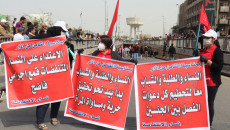Over 21,000 cases of domestic violence were recorded during one year in the governorates of Iraq, excluding the Iraqi Kurdistan Region IKR, some of which were committed against women, children and the elderly, at a rate of 59 cases per day.
According to statistics announced by the Supreme Judicial Council in Iraq, 2022 witnessed the registration of 21,595 cases of domestic violence in the governorates of Iraq (except the KRI), committed against children, women and the elderly.
Of the total number of registered cases, 963 cases were committed against children, 17,438 cases of violence against women, the majority of which took place in Rusafa, Baghdad, followed by Karbala governorate in the second place.
Statistics of the Supreme Judicial Council indicate that 22,365 cases of domestic violence were recorded in the governorates of Iraq (excluding the Kurdistan Region) for 2021, including 1,141 cases of violence against children, 18,602 cases against women, and 2,622 cases against the elderly.
Domestic violence is any form of violence or abuse violence that takes place within the family, carried out by any member of the family regardless of whether it is a man or a woman, parent or child. It is an action or omission that undermines the psychological, physical, economic or sexual integrity of another member of the family.
Mustafa Abdul Qadir, judge of the Personal Status Court in Tikrit, says that one of the reasons for the persistence of domestic violence cases is “ignorance of the rights and duties of the perpetrators and victims of domestic violence cases, in addition to the low cultural level.”
“Some of them grew up in families that believe that domestic violence is a natural thing and causes no harm,” he added.
He explained that the environment, climate and other problems affect the rates of domestic violence, given that individuals face many problems such as overcrowding, low level of services and housing problems, and when they are unable to obtain what they want and are unable to obtain job opportunities that help them reach their goals, they resort to violence.
Abdul Qadir indicated in an interview with the website of the Supreme Judicial Council that the effects of domestic violence appear more on children and women and lead to psychological and physical damage.
There are efforts to pass Child Protection and anti-domestic violence law, which provides some measures to prevent violence, yet have not been approved by the Iraqi Parliament.
Rafah Hussein, expert in family affairs, believes, "The current situation and the conditions that society in general is going through increase depression and nervous states among many people, especially unemployed men and those with limited income, which causes violent reactions among them towards women."
She stressed that "The impact of early marriage and marriage within certain specifications that are far from compatibility and harmony are matters that generate problems and quarrels."
Rafah indicated that although the Penal Code dealt with many cases of violence against women, we need to activate the Anti-Domestic Violence Law because it protects the rights of women and children.







